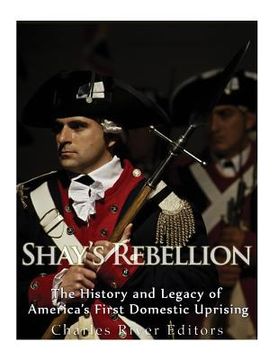Shays' Rebellion: The History and Legacy of America's First Domestic Uprising (en Inglés)
Reseña del libro "Shays' Rebellion: The History and Legacy of America's First Domestic Uprising (en Inglés)"
*Includes pictures *Includes accounts of the rebellion *Includes online resources and a bibliography for further reading *Includes a table of contents "You talk, my good sir, of employing influence to appease the present tumults in Massachusetts. I know not where that influence is to be found, or, if attainable, that it would be a proper remedy for the disorders. Influence is not government. Let us have a government by which our lives, liberties, and properties will be secured, or let us know the worst at once." - George Washington, referencing Shays' Rebellion in a letter to Light-Horse Harry Lee Even as the young United States successfully secured its independence, the new nation was beset by problems. The drafters of the Articles of Confederation had deliberately avoided giving the national legislature the power to tax, because Parliament had so abused that authority against the colonies, but this proved to be a severe limitation on the national government. Besides hampering the Continental Army, the inability of the national government to raise revenue made foreign policy difficult. Under the Articles of Confederation, the Congress was also completely unable to pay any of the debts it incurred to foreign powers during the Revolutionary War. Though allied powers had lent to the American government on favorable terms and no repayment was expected until the end of hostilities, the hope of ever paying national debts without a national government that could tax was slim. In particular, the prospect of the new nation defaulting on its loans from France led to the end of the Articles of Confederation. To top it all off, the Articles of Confederation also had no judiciary or executive branch. Therefore, laws passed by the Congress could not be enforced by the national government: the enforcement of laws was left to the mercy of the states. Likewise, there was no national judiciary to decide disputes over national law. Fueled at least in part by the weakness of the federal government to respond to military threats, the young country quickly faced a problem in the form of a rebellion led in New England by former Revolutionary War veteran Daniel Shays. On December 27, 1786, Samuel Lyman of Massachusetts wrote to his friend and confidant, Samuel Breck, "[N]ot only this Commonwealth but the union at large are in the most confused and confounded condition; we do not yet feel that sameness or unity of interest which is the only cement of any nation, and which is absolutely necessary to be felt in order to make us respectable & important; but this is not surprizing, for our national existence is but of yesterday, and this unity of interest is the result of time, it is the effect of habit, sentiment, & opinion, it is the unison of each of these..." Whether he meant to or not, Lyman captured in this one statement the very essence of the causes of the series of riots known collectively as Shays' Rebellion; for they began during the earliest years of American independence and were led by men who were, by their very nature, rebels. Unlike most countries in the world, 18th century America was made up of people who believed in change, and who were willing to leave their homelands and strike out for the unknown to find it. The men who had just years earlier participated in the American Revolution were not afraid to break down a government they did not like; indeed, many of them reveled in it. When Massachusetts enacted laws that Shays and others didn't like, the rebels had no qualms about taking up arms, and while the rebellion was eventually put down, changes were made to prevent similar problems in the future. Out of this came peace, order and freedom.

